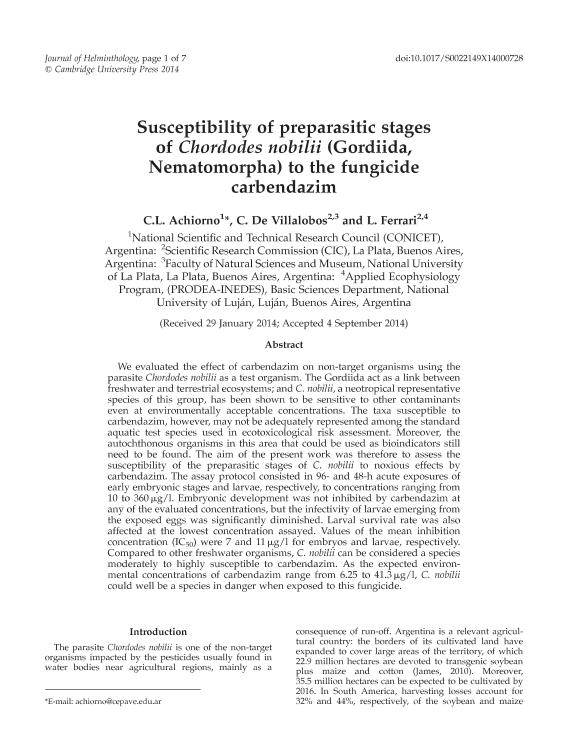Artículo
Susceptibility of preparasitic stages of Chordodes nobilii (Gordiida, Nematomorpha) to the fungicide carbendazim
Fecha de publicación:
11/2015
Editorial:
Cambridge University Press
Revista:
Journal Of Helminthology
ISSN:
0022-149X
e-ISSN:
1475-2697
Idioma:
Inglés
Tipo de recurso:
Artículo publicado
Clasificación temática:
Resumen
We evaluated the effect of carbendazim on non-target organisms using the parasite Chordodes nobilii as a test organism. The Gordiida act as a link between freshwater and terrestrial ecosystems; and C. nobilii, a neotropical representative species of this group, has been shown to be sensitive to other contaminants even at environmentally acceptable concentrations. The taxa susceptible to carbendazim, however, may not be adequately represented among the standard aquatic test species used in ecotoxicological risk assessment. Moreover, the autochthonous organisms in this area that could be used as bioindicators still need to be found. The aim of the present work was therefore to assess the susceptibility of the preparasitic stages of C. nobilii to noxious effects by carbendazim. The assay protocol consisted in 96- and 48-h acute exposures of early embryonic stages and larvae, respectively, to concentrations ranging from 10 to 360 mg/l. Embryonic development was not inhibited by carbendazim at any of the evaluated concentrations, but the infectivity of larvae emerging from the exposed eggs was significantly diminished. Larval survival rate was also affected at the lowest concentration assayed. Values of the mean inhibition concentration (IC50) were 7 and 11mg/l for embryos and larvae, respectively. Compared to other freshwater organisms, C. nobilii can be considered a species moderately to highly susceptible to carbendazim. As the expected environmental concentrations of carbendazim range from 6.25 to 41.3 mg/l, C. nobilii could well be a species in danger when exposed to this fungicide.
Palabras clave:
Parasite
,
Free-Living Stage
,
Pesticide
,
Bioassays
Archivos asociados
Licencia
Identificadores
Colecciones
Articulos(CEPAVE)
Articulos de CENTRO DE EST.PARASITOL.Y DE VECTORES (I)
Articulos de CENTRO DE EST.PARASITOL.Y DE VECTORES (I)
Citación
Achiorno, Cecilia Lujan; de Villalobos, Cristina; Ferrari, Lucrecia; Susceptibility of preparasitic stages of Chordodes nobilii (Gordiida, Nematomorpha) to the fungicide carbendazim; Cambridge University Press; Journal Of Helminthology; 89; 6; 11-2015; 748-754
Compartir
Altmétricas




